Coleman D. Ross
Certificates Focused on
Personal Financial Planning

Investment Planning Certificate
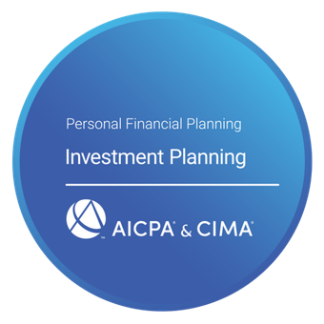

The AICPA’s Investment Planning Certificate program is an informative learning experience to enhance the learner’s knowledge in investment planning. As one of five parts of the AICPA’s Personal Financial Planning Certificate program, this certificate program includes eight courses covering steps in the investment planning process. I used these courses to broaden and reinforce my investment planning knowledge
The program is approved for 19.5 hours of continuing education credits for CPAs by the National Association of State Boards of Accounting. The eight courses in the program, which I completed in July 2024, are:
- The Investment Planning Process: The Investment Planning Process and Professional Responsibilities
- Investment Data Gathering and Analysis: Assessment of Risk; Macroeconomic Variables; Financial Analysis
- Creating the Investment Policy Statement: Income Tax Planning and Strategies; Asset Allocation Strategy; Developing the Investment Policy Statement
- Portfolio Management: Investment Manager Selection; Portfolio Management Basics
- Investment Vehicles and Strategies: Types of Investment Vehicles; Investment Strategies; Investment Valuation
- Investment Monitoring and Upkeeping: Measuring Performance and Goal Achievement; Updating the Investment Policy Statement; Portfolio Rebalancing
- Integrating Investments with the Financial Plan: Integration with Other Areas of the Personal Financial Plan
- Education Planning: The Planning Process and Gathering Information; Assembling Financial Aid and Funding Methods; Funding Strategies and Tax Planning; Integration
(back to the Education main page)

Retirement Planning Certificate
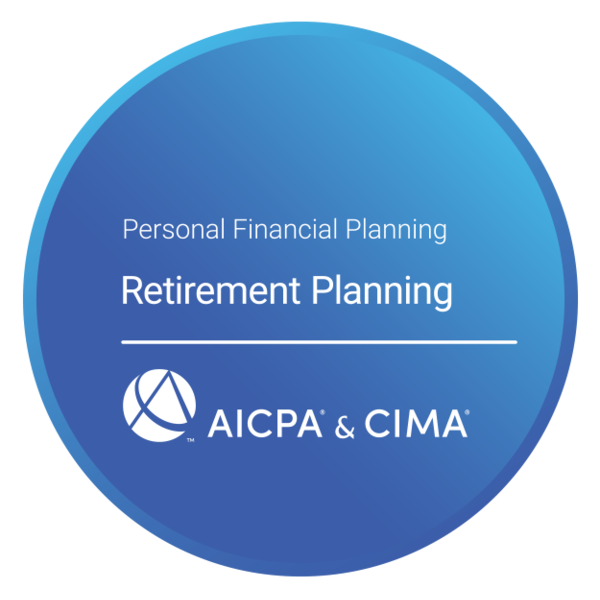

The AICPA’s Retirement Planning Process Certificate program is an informative learning experience to enhance the learner’s knowledge in retirement planning. As one of five parts of the AICPA’s Personal Financial Planning Certificate program, this certificate program includes six courses covering critical steps in the retirement planning life cycle, including unique planning for aging and chronically ill clients. I used these courses to broaden and reinforce my retirement planning knowledge.
The program is approved for 20.5 hours of continuing education credits for CPAs by the National Association of State Boards of Accounting. The six courses in the program, which I completed in August 2023, were:
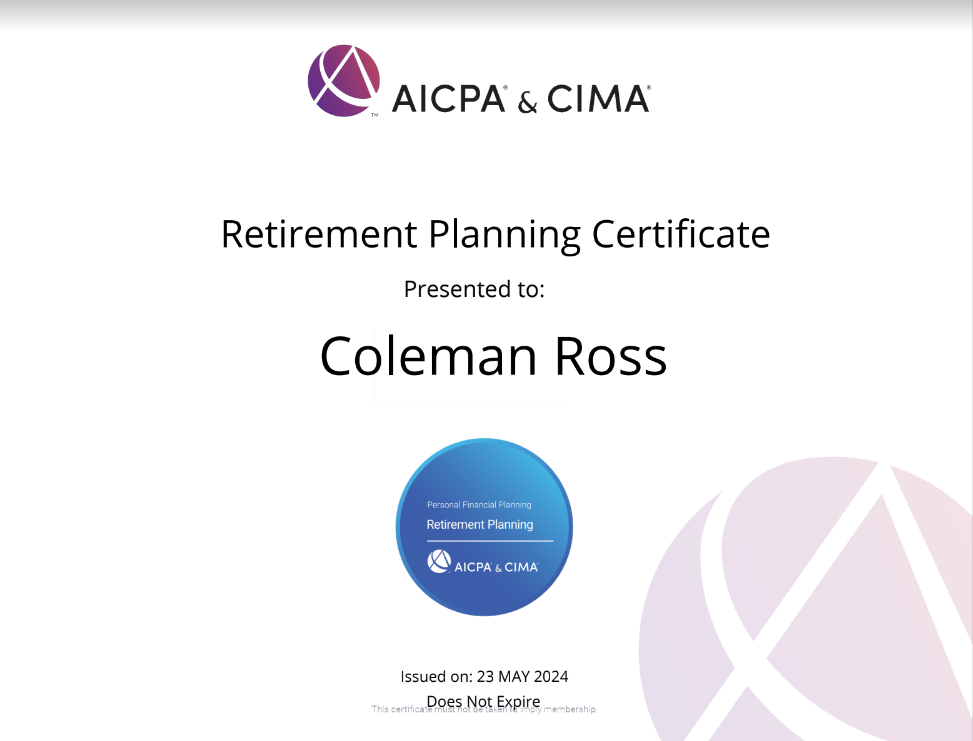

- The Retirement Planning Process: Financial Independence Planning; Regulatory and Legislative Environment
- Governmental and Employer Retirement Plans: Governmental Plans; Financial Independence; Qualified Plans; Retirement Planning, Other Employer Plans
- Personal Retirement Investments, Income, and Expenses: Personal Retirement Savings Vehicles; Social Security, Medicare, and Medicaid; Retirement Income and Expenses
- Analyzing Client Retirement Data: Key Assumptions and Risks; Modeling Techniques: Taxation, Income Tax Planning; Integrating with Other Areas of Personal Financial Planning
- Creating, Implementing, and Monitoring the Retirement Plan: Retirement Contribution Planning; Retirement Distribution and Tax Planning; Retirement Risk Management Tools and Strategies; Implement, Monitor, and Update Retirement Plans
- Elder and Special Needs Planning: Professional Environment Factors; Financial Decisions; Tax Planning; Integration with Other Areas of Personal Financial Planning
(back to the Education main page)

Estate Planning Certificate
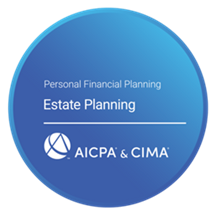

The AICPA’s Estate Planning Certificate program is an informative learning experience to enhance the learner’s knowledge in estate planning. As one of five parts of the AICPA’s Personal Financial Planning Certificate program, this certificate program includes eight courses covering steps in the estate planning life cycle, including gifting strategies, charitable planning, and integrating estate plans with tax and financial plans. I used these courses to broaden and reinforce my estate planning knowledge.
The program is approved for 18 hours of continuing education credits for CPAs by the National Association of State Boards of Accounting. The eight courses in the program, which I completed in August 2022, were:
- The Estate Planning Process: Fundamentals of Estate Planning; Estate Tax Calculation; Basic Estate Planning Process
- Trusts and Estate Planning Documents: Estate Planning Documents; Trusts: Types, Features and Taxation; Benefits of Trusts
- Basic Estate and Gifting Strategies: Basic Estate Planning Strategies; Gifting Strategies
- Advanced Estate Planning Strategies: Advanced Estate Planning Strategies; Generation-Skipping Transfer Tax
- Closely Held Business Estate Planning: Closely-Held Business Issues;
- Incapacity and Postmortem Estate Planning: Incapacity Planning; Postmortem Estate Planning; Other Estate Planning Considerations
- Integrating Estate Planning with the Tax and Financial Plan: Taxation and Income Tax Planning; Integration with Other Areas of Personal Financial Planning
- Charitable Planning: Charitable Gifts; Charitable Trusts and Planning Tools: Tax Planning; Integrating Charitable Planning with the Financial Plan
In addition to the Estate Planning Certificate program, I also completed four other courses pertinent to estate planning: Preparing Form 706, U.S. Estate (and Generation-Skipping Transfer) Tax Return (February 2023); Preparing Form 709, U.S. Gift (and Generation-Skipping Transfer) Tax Return (March 2023); Estates and Trusts Primer (August 2023), and The Life Cycle of a Revocable Living Trust (August 2024). Combined, these courses are approved for 13 hours of continuing education credits for CPAs by the National Association of State Board of Accounting.
Topics covered by the AICPA Estate and Trusts Primer seven-hour course follow:
- What is a Trust? What is an Estate?
- The Fundamentals of Fiduciary Accounting;
- Taxation of Trusts and Decedent’s Estates: An Overview;
- Gross Income for Trusts and Decedents Estates;
- Ordinary Deductions and Credits;
- the Income Distribution Deduction;
- How Beneficiaries are Taxed;
- Special Rules Roundup;
- The Tax Treatment of Grantor Trusts;
- Taxation of Special Trusts;
- Filing Form 1041, U.S. Income Tax Return for Estates and Trusts
(back to the Education main page)
 Risk Management and
Risk Management and
Insurance Planning Certificate
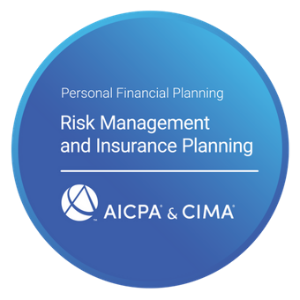

The AICPA’s Risk Management and Insurance Planning Certificate program is an informative learning experience to enhance the learner’s knowledge in risk management and insurance planning. As one of five parts of the AICPA’s Personal Financial Planning Certificate program, this certificate program includes eight courses covering critical steps in the risk management and insurance planning process from insurance contracts and annuities to deferred compensation and integrating the business with the owner's personal financial plan. I used these courses to broaden and reinforce my risk management and insurance knowledge in addition to supporting my board governance role at Pan-American Life Insurance Group.
The program is approved for 20 hours of continuing education credits for CPAs by the National Association of State Boards of Accounting. The eight courses in the program, which I completed in August 2022, were:
- The Risk Management Planning Process: The Risk Management Process; Principles of Risk Management; Identification of Potential Loss Exposures; Risk Management Techniques; Professional Environment; Regulatory Environment; Insurance Carrier Environment; Compensation Methods
- Insurance Contracts and Needs Analysis: Insurance Needs Analysis; Elements of Insurance Policies; Legal Requirements of Insurance Contracts
- Life Insurance: Types of Life Insurance; Key Features of Life Insurance; Taxation and Tax Planning with Life Insurance; Integrating Life Insurance within the Overall Financial Plan
- Annuities: Types of Annuities; Method of Premium Payment; Number of Lives Insured; Payment Types; Payment Plans; Taxation and Income Tax Planning; Integration with Other Areas of Personal Financial Planning
- Medical, Disability, and Property and Casualty Insurance: Health Insurance and Long-term Care Insurance; Disability Insurance; Property and Casualty Insurance; Taxation and Income Tax Planning; Integration of Each with Other Areas of Personal Financial Planning
- Group Insurance and Employee Benefits: Group Insurance; Employee Benefits; Taxation; Integration with Personal Financial Planning
- Executive and Deferred Compensation Arrangements: Executive Compensation Plans; Equity Compensation Plans; Taxation; Integration with Personal Financial Planning
- Financial Planning with Business Owners: Sole Proprietorships; Partnerships; S Corporations; C Corporations; Taxation; Integration with Financial Plan
(back to the Education main page)
 Personal Financial Planning
Personal Financial Planning
Practical Applications Certificate
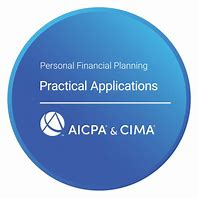

The AICPA’s Personal Financial Planning Practical Applications Certificate program is an informative learning experience to enhance the learner’s knowledge in investment planning, education planning, retirement planning, elder planning, estate planning, risk management and insurance planning, cash flow planning, and tax planning. As one of five parts of the AICPA’s Personal Financial Planning Certificate program, this certificate program includes five courses covering steps in the financial planning process. I used these courses to broaden and reinforce my financial planning knowledge.
The program is approved for 13.0 hours of continuing education credits for CPAs by the National Association of State Boards of Accounting. The five courses in the program, which I completed in July 2024, were:
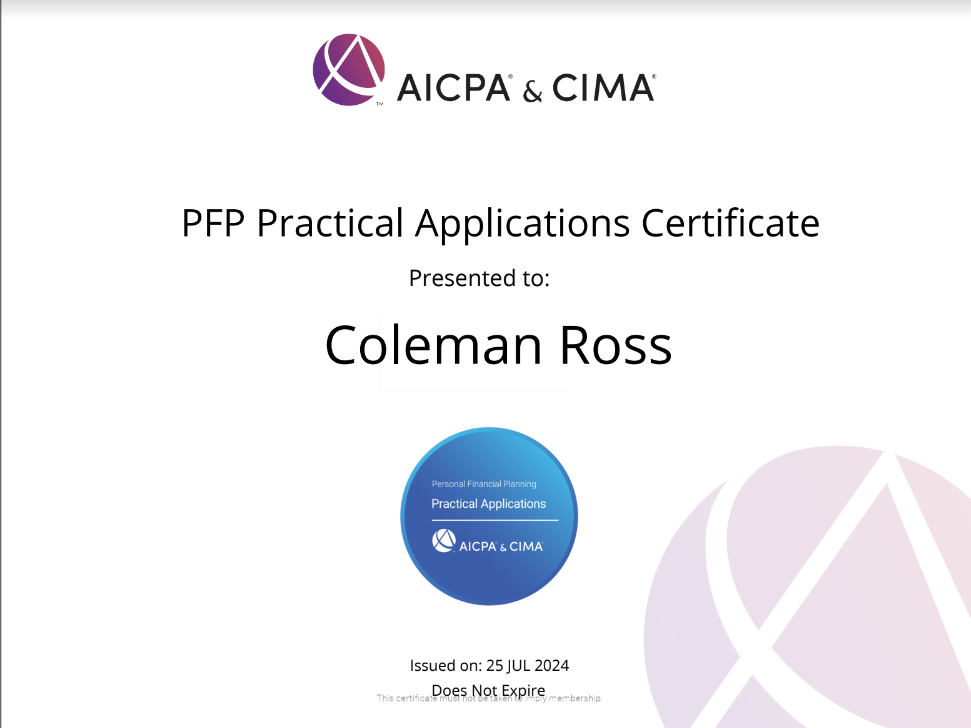

- Personal Financial Planning Standards and Responsibilities
- Personal Financial Planning Regulatory and Fiduciary Landscape
- Personal Financial Planning Process
- Cash Management Strategies
- Personal Financial Planning in Practice: Four Case Studies
(back to the Education main page)


